leave详细固定搭配用法
leave的用法和常见搭配
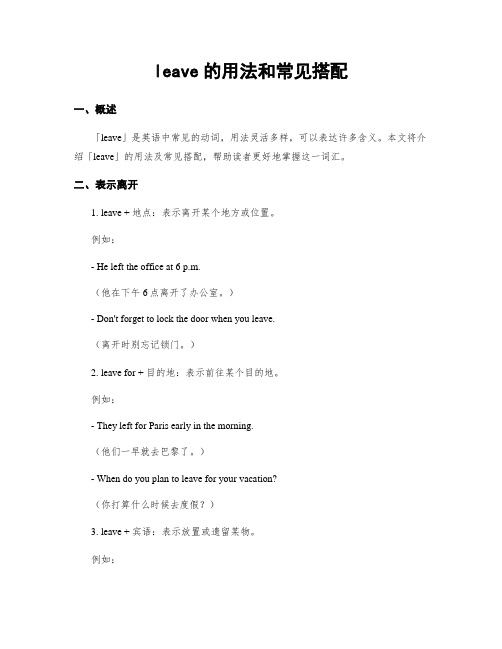
leave的用法和常见搭配一、概述「leave」是英语中常见的动词,用法灵活多样,可以表达许多含义。
本文将介绍「leave」的用法及常见搭配,帮助读者更好地掌握这一词汇。
二、表示离开1. leave + 地点:表示离开某个地方或位置。
例如:- He left the office at 6 p.m.(他在下午6点离开了办公室。
)- Don't forget to lock the door when you leave.(离开时别忘记锁门。
)2. leave for + 目的地:表示前往某个目的地。
例如:- They left for Paris early in the morning.(他们一早就去巴黎了。
)- When do you plan to leave for your vacation?(你打算什么时候去度假?)3. leave + 宾语:表示放置或遗留某物。
例如:- She left her bag on the table and went outside.(她把包放在桌子上出去了。
)- Please don't leave any trash behind.(请不要留下任何垃圾。
)4. leave (sb.) alone:表示不干涉或不打扰某人。
例如:- Leave me alone! I need some quiet time.(别打扰我!我需要一些安静时间。
)- Mom, can you please just leave us alone for a while?(妈妈,你能不能别打扰我们一会儿?)三、表示遗忘或忽略1. leave + 宾语 + 某状态:表示忘记或未关心某事物的状态。
例如:- I left the soup boiling on the stove and it burned.(我把汤放在炉子上煮着,结果它糊了。
)- He left his phone on silent during the meeting and missed an important call.(他在会议期间把手机调成静音,错过了一个重要电话。
leave的用法搭配
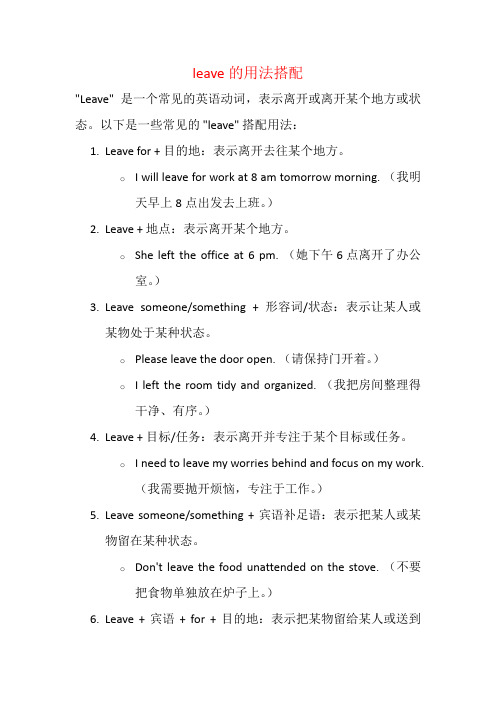
leave的用法搭配"Leave" 是一个常见的英语动词,表示离开或离开某个地方或状态。
以下是一些常见的 "leave" 搭配用法:1.Leave for + 目的地:表示离开去往某个地方。
o I will leave for work at 8 am tomorrow morning. (我明天早上8点出发去上班。
)2.Leave + 地点:表示离开某个地方。
o She left the office at 6 pm. (她下午6点离开了办公室。
)3.Leave someone/something + 形容词/状态:表示让某人或某物处于某种状态。
o Please leave the door open. (请保持门开着。
)o I left the room tidy and organized. (我把房间整理得干净、有序。
)4.Leave + 目标/任务:表示离开并专注于某个目标或任务。
o I need to leave my worries behind and focus on my work.(我需要抛开烦恼,专注于工作。
)5.Leave someone/something + 宾语补足语:表示把某人或某物留在某种状态。
o Don't leave the food unattended on the stove. (不要把食物单独放在炉子上。
)6.Leave + 宾语+ for + 目的地:表示把某物留给某人或送到某个地方。
o She left a note for me on the kitchen counter. (她在厨房柜台上留了一张纸条给我。
)7.Leave it to someone:表示把事情交给某人去处理。
o I'll leave it to you to make the final decision. (我将把最终决定交给你来做。
leave的固定短语搭配
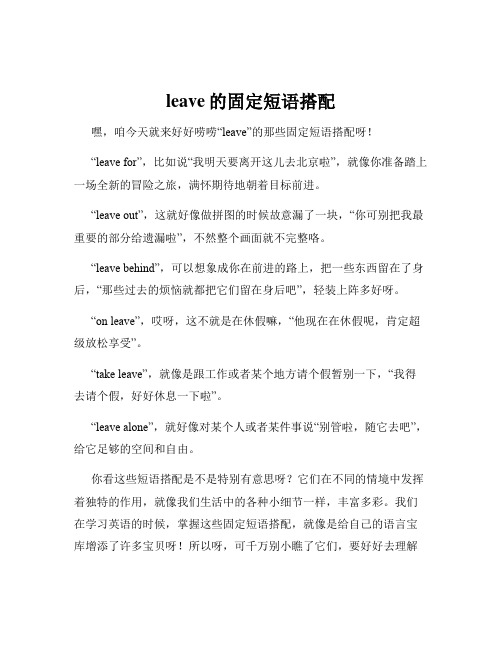
leave的固定短语搭配
嘿,咱今天就来好好唠唠“leave”的那些固定短语搭配呀!
“leave for”,比如说“我明天要离开这儿去北京啦”,就像你准备踏上一场全新的冒险之旅,满怀期待地朝着目标前进。
“leave out”,这就好像做拼图的时候故意漏了一块,“你可别把我最重要的部分给遗漏啦”,不然整个画面就不完整咯。
“leave behind”,可以想象成你在前进的路上,把一些东西留在了身后,“那些过去的烦恼就都把它们留在身后吧”,轻装上阵多好呀。
“on leave”,哎呀,这不就是在休假嘛,“他现在在休假呢,肯定超级放松享受”。
“take leave”,就像是跟工作或者某个地方请个假暂别一下,“我得去请个假,好好休息一下啦”。
“leave alone”,就好像对某个人或者某件事说“别管啦,随它去吧”,给它足够的空间和自由。
你看这些短语搭配是不是特别有意思呀?它们在不同的情境中发挥着独特的作用,就像我们生活中的各种小细节一样,丰富多彩。
我们在学习英语的时候,掌握这些固定短语搭配,就像是给自己的语言宝库增添了许多宝贝呀!所以呀,可千万别小瞧了它们,要好好去理解
和运用哦!我的观点就是,这些“leave”的固定短语搭配真的很重要,能让我们的英语表达更准确、更生动呢!。
leave详细固定搭配用法

【13】leave sth about (1)乱丢/乱放某物He is apt to leave things about.他总喜欢把东西到处乱放。
(2)把…随便乱放Don't leave your things about.别把东西到处乱扔。
【14】leave sth aside搁置/不考虑某物/某事Let's leave the matter aside for a moment.我们把这件事搁一会儿再说。
【15】leave sth behind(1)忘带/留下/丢弃某事Don't leave me behind.不要把我忘了。
He left his wife and children behind.他抛下了妻子儿女。
主语+谓语+be+left behindThe luggage has been left behind.忘了带行李。
In their withdrawal, much of the heavy equipment had to be left behind. 在撤退时,他们不得不丢弃许多重型装备。
(2)使某人落后;把某人丢在后面leave sb/sth behindThe young athlete soon left the others far behind.那位年轻运动员很快就把其他选手抛在后面。
主语+谓语+be left behindHe was left behind in the race.他赛跑时落在后面。
If you don't study hard, you'll be left behind.你要是不努力学习,就会落在别人后面。
【16】leave for +地点名词(i)出发去(某地)去某地/前往某地We're leaving for Rome next week.我们下星期要到罗马去。
The newly married couple are leaving for their honeymoon.这对新婚夫妇将动身外出度蜜月。
leave的固定搭配短语
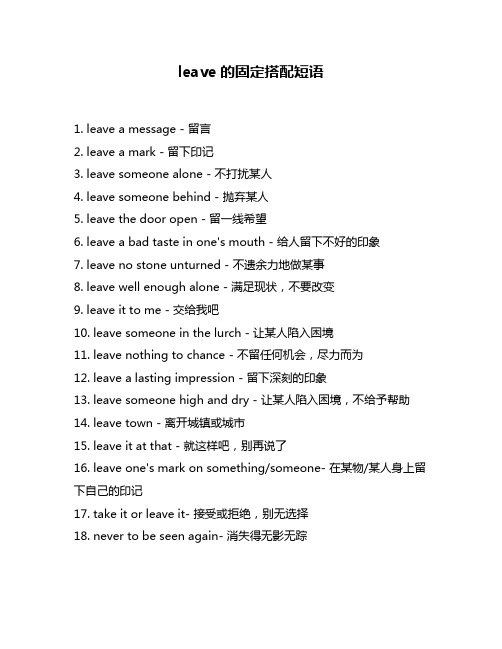
leave的固定搭配短语
1. leave a message - 留言
2. leave a mark - 留下印记
3. leave someone alone - 不打扰某人
4. leave someone behind - 抛弃某人
5. leave the door open - 留一线希望
6. leave a bad taste in one's mouth - 给人留下不好的印象
7. leave no stone unturned - 不遗余力地做某事
8. leave well enough alone - 满足现状,不要改变
9. leave it to me - 交给我吧
10. leave someone in the lurch - 让某人陷入困境
11. leave nothing to chance - 不留任何机会,尽力而为
12. leave a lasting impression - 留下深刻的印象
13. leave someone high and dry - 让某人陷入困境,不给予帮助
14. leave town - 离开城镇或城市
15. leave it at that - 就这样吧,别再说了
16. leave one's mark on something/someone- 在某物/某人身上留下自己的印记
17. take it or leave it- 接受或拒绝,别无选择
18. never to be seen again- 消失得无影无踪
19.leave the nest- 离开家庭独立生活
20.leave a gap- 留出空隙。
leave句型结构
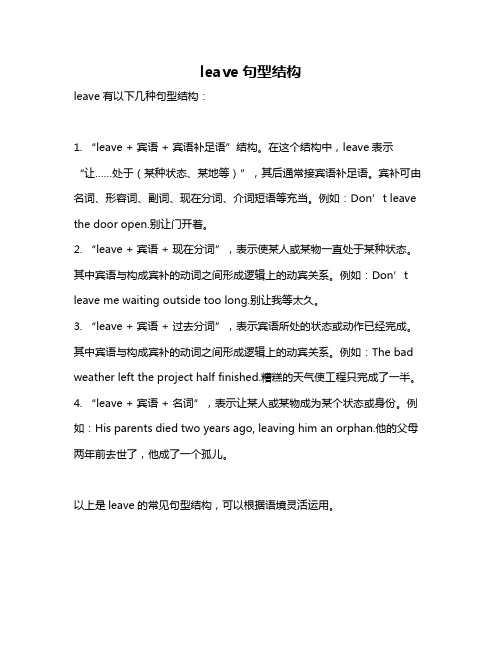
leave句型结构
leave有以下几种句型结构:
1. “leave + 宾语 + 宾语补足语”结构。
在这个结构中,leave表示“让……处于(某种状态、某地等)”,其后通常接宾语补足语。
宾补可由名词、形容词、副词、现在分词、介词短语等充当。
例如:Don’t leave the door open.别让门开着。
2. “leave + 宾语 + 现在分词”,表示使某人或某物一直处于某种状态。
其中宾语与构成宾补的动词之间形成逻辑上的动宾关系。
例如:Don’t leave me waiting outside too long.别让我等太久。
3. “leave + 宾语 + 过去分词”,表示宾语所处的状态或动作已经完成。
其中宾语与构成宾补的动词之间形成逻辑上的动宾关系。
例如:The bad weather left the project half finished.糟糕的天气使工程只完成了一半。
4. “leave + 宾语 + 名词”,表示让某人或某物成为某个状态或身份。
例如:His parents died two years ago, leaving him an orphan.他的父母两年前去世了,他成了一个孤儿。
以上是leave的常见句型结构,可以根据语境灵活运用。
leave的固定搭配短语
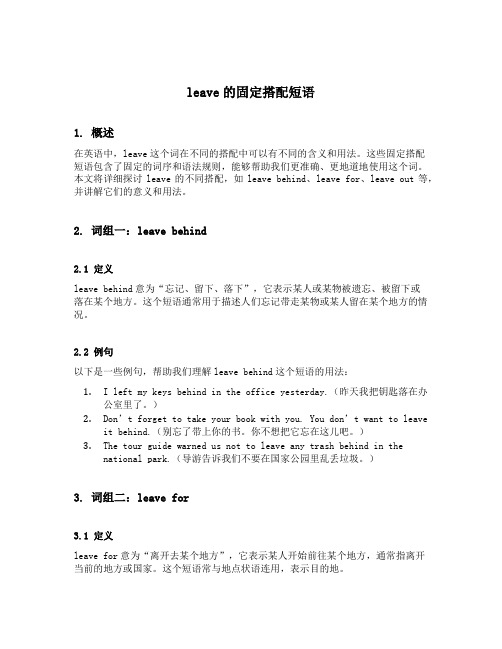
leave的固定搭配短语1. 概述在英语中,leave这个词在不同的搭配中可以有不同的含义和用法。
这些固定搭配短语包含了固定的词序和语法规则,能够帮助我们更准确、更地道地使用这个词。
本文将详细探讨leave的不同搭配,如leave behind、leave for、leave out等,并讲解它们的意义和用法。
2. 词组一:leave behind2.1 定义leave behind意为“忘记、留下、落下”,它表示某人或某物被遗忘、被留下或落在某个地方。
这个短语通常用于描述人们忘记带走某物或某人留在某个地方的情况。
2.2 例句以下是一些例句,帮助我们理解leave behind这个短语的用法:1.I left my keys behind in the office yesterday.(昨天我把钥匙落在办公室里了。
)2.Don’t forget to take your book with you. You don’t want to leaveit behind.(别忘了带上你的书。
你不想把它忘在这儿吧。
)3.The tour guide warned us not to leave any trash behind in thenational park.(导游告诉我们不要在国家公园里乱丢垃圾。
)3. 词组二:leave for3.1 定义leave for意为“离开去某个地方”,它表示某人开始前往某个地方,通常指离开当前的地方或国家。
这个短语常与地点状语连用,表示目的地。
3.2 例句以下是一些例句,帮助我们理解leave for这个短语的用法:1.They are leaving for Paris tomorrow morning.(他们明天早上去巴黎。
)2.We should leave for the airport now if we don’t want to miss ourflight.(如果我们不想错过飞机的话,现在应该去机场了。
leave的用法和短语

leave的用法和短语一级标题:Leave的用法和短语二级标题1:Leave的基本解释和常见用法Leave是一个常用的动词,在不同语境下有不同的用法。
它可以作为动词,名词或者短语来使用。
本文将重点介绍leave作为动词时的用法和常见搭配。
作为一个及物动词,leave在最基本的意思上表示离开、遗留或使某物保持某种状态。
例如,“He left the room”意味着他离开了房间。
1. 离开某地或某人:当leave指离开某个特定地方或离开某个人时,通常会使用以下表达方式:- leave for + 地点:表示前往某处。
例如,“I will leave for London tomorrow.”- leave at + 时间:表示在某个特定时间离开。
例如,“He left at 8 o'clock in the morning.”- leave sb. behind:留下某人。
例如,“Don't leave me behind!”2. 遗忘、遺落(把东西丢在别处):当leave指忘记或丢失时,我们可以使用以下短语:- leave sth. behind:将物品遗忘在某处。
“She acci dentally left her keys behind at the office.”- leave sth. somewhere:将物品丢失在某处。
“I left my umbrella somewhere yesterday, and I can't find it now.”3. 剩下、保持某种状态:作为一个动态词,leave可以表示“剩下”或“保持某种状态”。
以下是一些常见的搭配方式:- leave sth. + 形容词:表示将某物保持在某种状态下。
“Please leave the d oor open.”- leave sb./sth. + 名词:指留给某个人或留有某个物品。
- 1、下载文档前请自行甄别文档内容的完整性,平台不提供额外的编辑、内容补充、找答案等附加服务。
- 2、"仅部分预览"的文档,不可在线预览部分如存在完整性等问题,可反馈申请退款(可完整预览的文档不适用该条件!)。
- 3、如文档侵犯您的权益,请联系客服反馈,我们会尽快为您处理(人工客服工作时间:9:00-18:30)。
(1)乱丢/乱放某物He is apt to leave things about.他总喜欢把东西到处乱放。
(2) 把…随便乱放Don't leave your things about. 别把东西到处乱扔。
【14】leave sth aside搁置/不考虑某物/某事Let's leave the matter aside for a moment.我们把这件事搁一会儿再说。
【15】leave sth behind(1)忘带/留下/丢弃某事Don't leave me behind. 不要把我忘了。
He left his wife and children behind. 他抛下了妻子儿女。
主语+谓语+be+left behindThe luggage has been left behind.忘了带行李。
In their withdrawal, much of the heavy equipment had to be left behind. 在撤退时,他们不得不丢弃许多重型装备。
(2)使某人落后;把某人丢在后面leave sb/sth behindThe young athlete soon left the others far behind.那位年轻运动员很快就把其他选手抛在后面。
主语+谓语+be left behindHe was left behind in the race.他赛跑时落在后面。
If you don't study hard, you'll be left behind.你要是不努力学习,就会落在别人后面。
【16】leave for +地点名词(1)出发去(某地) 去某地/前往某地We're leaving for Rome next week.我们下星期要到罗马去。
The newly married couple are leaving for their honeymoon.这对新婚夫妇将动身外出度蜜月。
(2)leave A for B 离开A地方前往B地方She left Beijing for New York last year.她去年离开北京去了纽约。
(3)离开(某人)以同(他人)生活在一起;离开(某职位)以寻求leave sb/sth for sb/sth He left his wife for a worthless actress.他离开了妻子,同一位不值一提的女演员生活在一起。
The director is thinking of leaving the firm for a better position elsewhere.经理正在考虑离开这个公司,到其他地方找个更好的职位。
He left medicine for the law.他离开医学界而转入法学界。
【17】leave sb holding the bag/sack让某人背黑锅lThey all ran off and left me holding the bag.他们全都逃了,留下我一个人背黑锅。
【18】leave sth in 让…留下They have left those words in after all.他们毕竟还是保留了那些话。
The editor finally agreed to leave the paragraph in.编辑最后同意把那一段保留下来。
【19】leave it at that 行了,够了,到此为止I think I've given you a strong enough warning;we'll leave it at that for the moment. 我想我给你的警告也够厉害的了,现在暂时就不说了。
Let's leave it at that;we've worked hard enough today.我们就到这儿吧,今天也够辛苦的了。
【20】leave nothing/much to be done(1)leave nothing to be done十分完美/令人满意The work leaves nothing to be desired. 这项工作十分完美。
(2)leave much to be done 不十分完美/不令人满意What we've done still leaves much to be desired.我们的工作还有很多不足之处。
This hotel leaves much to be desired.这个旅馆不能令人满意【21】leave off(1)停止(做)某事,戒掉某事Has the rain left off yet?雨停了吗?Let's leave off here for lunch.吃饭了,就到此为止吧。
I think we should leave off now and have some coffee.我想现在我们该休息一下,喝点咖啡了。
(2)leave sth ⇔ off 脱掉某物Do not leave off your overcoat, it is cold.不要脱大衣,天气很冷。
We left off work earlier than usual today.今天,我们比平时下班早。
用于be ~ed 结构Cooling pumps were left off for more than an hour.冷却泵关了一个多小时。
(3)leave off v-ing停止一直那样做某事Leave off doing that, will you?别那样干了,好吗?Please leave off biting your nails.请不要再咬指甲。
Leave off teasing that boy.不要再逗那个男孩了。
Leave off interrupting me whenever I'm talking!无论我什么时候说话,不要打断我!It is time to leave off talking and to start acting.现在该停止讨论,开始行动了。
They leave off quarrelling to sleep.他们停止了争吵,然后就去睡觉了。
【22】leave on(1)让…留在原处Leave the cloth on,I want to lay the table for supper.不要取下台布,我要摆桌子吃晚饭了。
(2)让(火)燃着,让…开着allow to remain alight;be burningDon't leave the light on when you go out.出去时,请关灯。
I wish you wouldn't leave the air-conditioner on when you go out. 希望你出去时,别让空调开着。
【23】leave out遗漏,省略,删去;未顾及,忽略某物In copying this document, be careful not to leave out any word. 抄写这份文件时,当心不要漏掉任何词。
I notice that the advertisement leaves out the price of the product.我注意到广告没有提到产品的价格。
If you leave your bicycle out at night, it'll soon have trouble with rust.如果你晚上把自行车放在外面,车很快就会生锈的。
用于be ~ed 结构Not a comma was left out.一个逗号也没漏掉。
Nothing of value is left out.没有删掉任何有价值的东西。
Nobody speaks to him;he is always left out.没人跟他讲话,他总是被冷落。
Please complete this cheque properly;the date has been left out.请把这张支票好好填写完整,你把日期漏填了。
【24】leave sth over 留下/剩下某物(1)留下/剩下/剩余某物No food has been left over after the meal.饭后没有剩下什么。
(2)延后/推迟;(暂时搁置)留待以后处理某物/某事postpone;leave to be dealt with at a later dateLet's leave the meeting over till next month.我们把会议推迟到下月吧。
We'll leave the meat over for tomorrow.我们要把肉留到明天吃。
◇用于be ~ed 结构That matter can be left over until the committee meets next month.此事可延至下周委员会开会时再进行处理。
He thought the matter might be left over for the present.他认为这事眼下也许会缓一缓。
【25】leave sth up to sb 把某事交由某人处理Leave it up to me,I'll see to it.留给我吧,我会负责的。
用于be ~ed 结构At some colleges, the amount of work you will do is left entirely up to you. 在有些大学里,做多少功课完全由你自己来决定。
【26】leave with(1)将某人/某事留给某人照管leave sb/sth with sbMary left the children with her mother while she went on holiday.玛丽度假时把孩子留给母亲照管。
Leaving the baby with me, he went to join the Army.他把孩子托付给我就参军去了。
You can leave a message with his secretary .你可以留个条交给他的秘书。
Leave the parcel with me,I'll see that it gets delivered.把包裹交给我,我负责寄出去。
